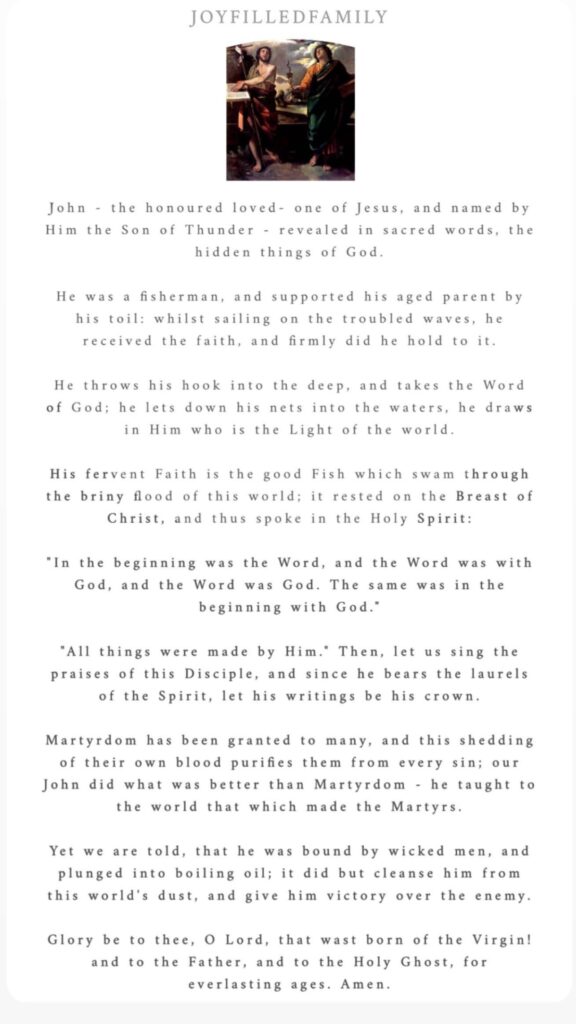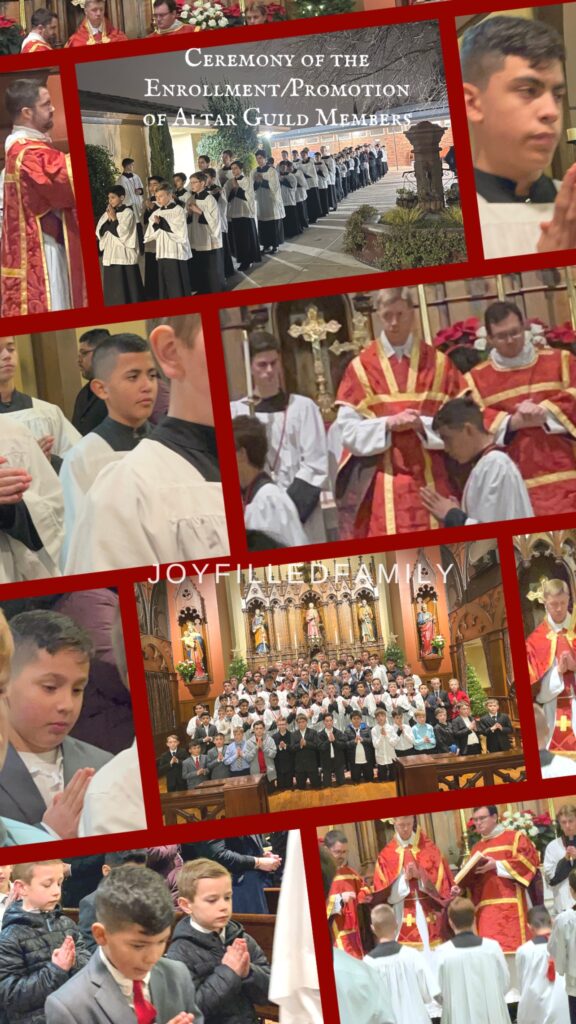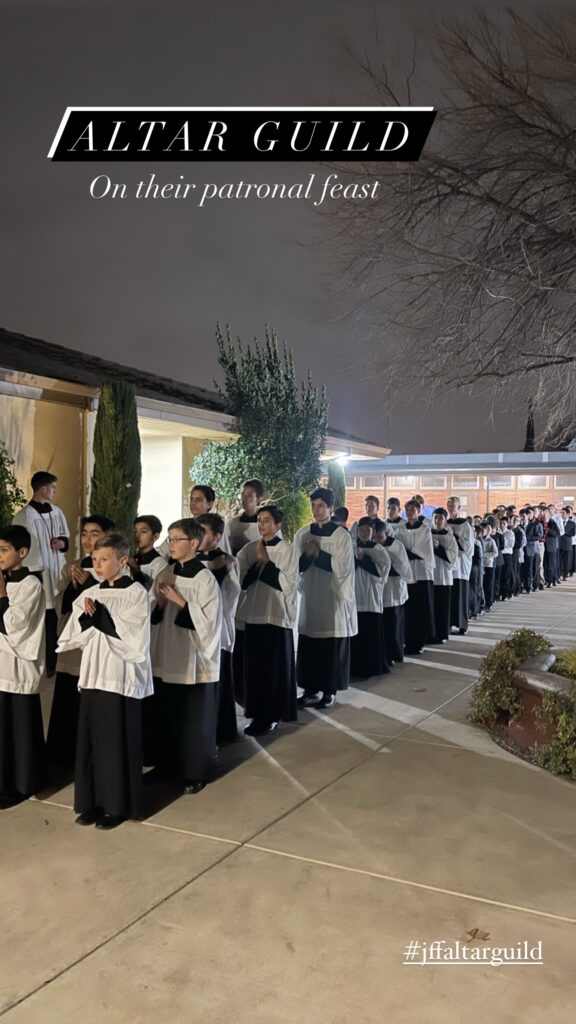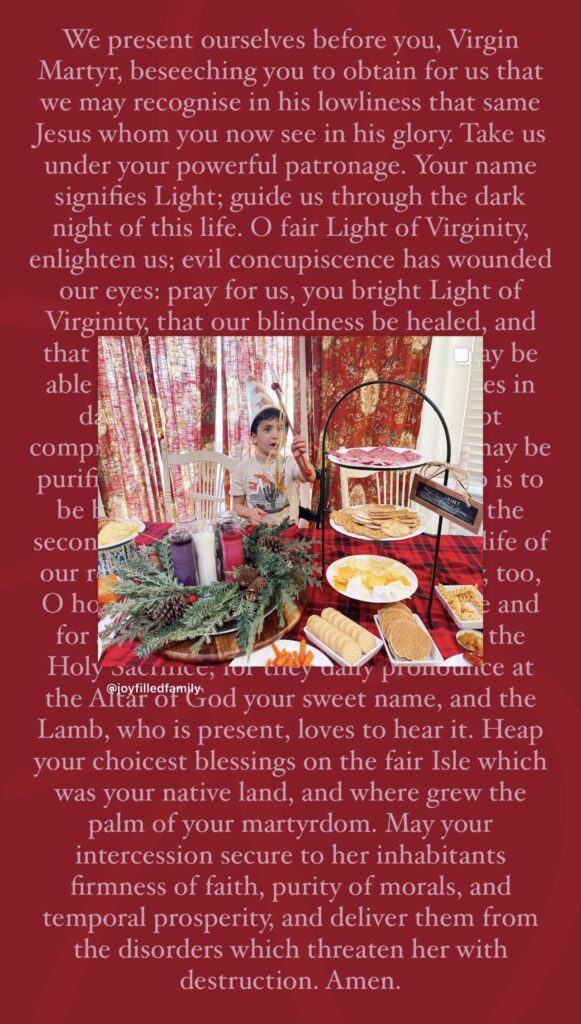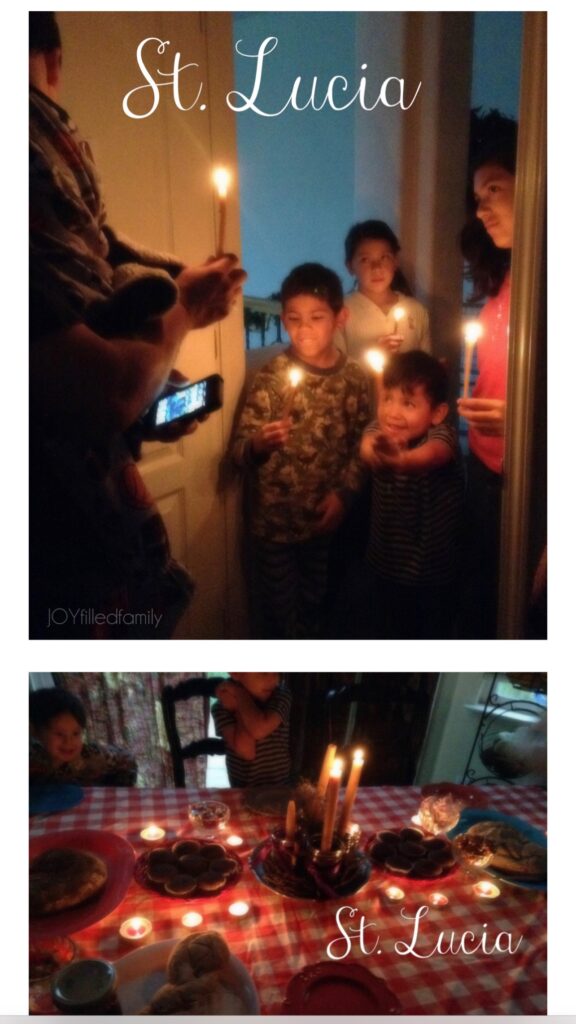December 16 – Commemoration of SAINT EUSEBIUS
Eusebius was bishop of Vercelli in northern Italy in the middle of the fourth century. St. Ambrose says that he was the first in the West to introduce the practice of community life among secular clergy. Eusebius was exiled to Palestine and Cappadocia by Emperor Constantius for his defense of St. Athanasius and his opposition to the Arian heresy, which denied the divinity of Christ. Though greatly mistreated in exile, [he won the title of martyr for his grievous sufferings] the courageous bishop survived the ordeal and, on the death of the Emperor, took up the fight for the Church once more. He won other enemies, however, by urging clemency toward repentant Arian bishops, the very ones who had been a cause of his exile. St. Eusebius died in peace at Vercelli in 371.
Book of Saints – Eusebius of Vercelli
(Saint) Bishop, Martyr (December 16) (4th century) He was by birth a native of Sardinia; and after passing some years in Rome as a priest, he was consecrated Bishop of Vercelli in the present Province of Piedmont (A.D. 340). A great and active champion of the Catholic Faith against the Arians, he was banished by their machinations to Syria, where he underwent many hardships. Before returning to Vercelli under Julian he visited Saint Athanasius at Alexandria. In the words of Saint Jerome: “On the return of Eusebius, Italy put off her mourning.” Thenceforth to the year of his death (A.D. 370) he devoted himself, in concert with Saint Hilary of Poitiers, to the extirpation of Arianism. By exception, on account of the much that he went through in the cause of religion, he is honoured liturgically as a Martyr.
Monks of Ramsgate. “Eusebius of Vercelli”. Book of Saints, 1921.
Pictorial Lives of the Saints – Saint Eusebius, Bishop
Saint Eusebius was born of a noble family, in the island of Sardinia, where his father is said to have died in prison for the faith. The Saint’s mother carried him and his sister, both infants, to Rome. Eusebius having been ordained, served the Church of Vercelli with such zeal that on the Episcopal chair becoming vacant, he was unanimously chosen, by both clergy and people, to fill it. The holy bishop saw that the best and first means to labor effectually for the edification and sanctification of his people, was to have a zealous clergy. He was at the same time very careful to instruct his flock, and inspire them with the maxims of the Gospel. The force of the truth which he preached, together with his example, brought many sinners to a change of life. He courageously fought against the heretics, who had him banished to Scythopolis, and thence to Upper Thebais in Egypt, where he suffered so grievously as to win, in some of the panegyrics in his praise, the title of martyr. He died in the latter part of the year 371.
Reflection – The routine of every-day, commonplace duties is no hindrance to a free intimacy with God. He will disclose His hidden ways to you in proportion as you follow your vocation faithfully, whether in the world or the cloister.
“Saint Eusebius, Bishop”. Pictorial Lives of the Saints, 1922.
The Liturgical Year: Saint Eusebius, Bishop of Vercelli, and Martyr
When asked to tell the names of the Saints who were foremost in defending the dogma of the Incarnation, we think at once of the intrepid Eusebius of Vercelli as one of the glorious number. The Catholic faith, which was so violently attacked in the fourth century by the Arian heresy, was maintained at that time by the labours and zeal of four Sovereign Pontiffs: Sylvester, who confirmed the decrees of the Council of Nicaaa; Julius, the supporter of Saint Athanasius; Liberius, whose faith failed not, and who, when restored to his liberty, confounded the Arians; and, lastly, Damasus, who destroyed the last hopes of the heretics. One of these four Pontiffs appears on our Advent Calendar – Damasus, whose feast we kept but a few days since. The four Popes have for their fellow-combatants, in this battle for the Divinity of the Incarnate Word, four great Bishops, of whom it may be said, that the defence of the dogma of the Consubstantiality of the Son of God was what they lived for, and that to say anathema to them was to say anathema to Christ himself; all four most powerful in word and work, lights of the Churches of the world, objects of the people’s love, and the dauntless witnesses of Jesus. The first and greatest of the four is the Bishop of the second See of Christendom, Saint Athanasius, the Patriarch of Alexandria; the second is Saint Ambrose of Milan, whose feast we kept on the seventh of this month; the third is the glory of Gaul, Saint Hilary, Bishop of Poitiers; the fourth is the ornament of Italy, Saint Eusebius, Bishop of Vercelli, whom we have to honour today.
Hilary will come to us during Christmastide, and will stand at the Crib of the Word, whose Divinity he so bravely confesses; Athanasius will meet us at Easter, and help us to celebrate, in the triumphant Resurrection, Him whom he proclaimed as God in those dark times, when human wisdom hoped to destroy, by a fifty years of peace, that Church which had survived the storm of three centuries of persecution. Saint Eusebius’ place is Advent; and divine Providence has thus chosen him as one of the patrons of the faithful during this mystic season; his powerful prayers will help us to come devoutly to Bethlehem, and see in the Child, that is lying there, the eternal Word of God. So great were the sufferings which Saint Eusebius had to undergo for the Divinity of Jesus, that the Church awards him the honours of a Martyr, although he did not actually shed his blood. Let us now listen to the admirable account which the Church gives us of his life.
Eusebius, by birth a Sardinian, was a Lector in the Church at Rome, and afterwards Bishop of Vercelli. It may well be said that it was God himself who chose him to be the pastor of this Church, for the Electors, who had never before seen him, no sooner set their eyes upon him than they preferred him before all their fellow citizens. Eusebius was the first of the Bishops in the Western Church who established Monks in his Church to exercise the functions of the Clergy; he did it in order that he might thus unite, in the same persons, the detachment from riches and the dignity of Levites. It was during this time that the impious doctrines of the Arians were devastating the whole of the West; and so vigorously did Eusebius attack them, that Pope Liberius’ greatest consolation was the unflinching faith of this holy man. It was on this account, that the same Pope, knowing that the Spirit of God burned in Eusebius’ soul, commissioned him to go, accompanied by his Legates, to the Emperor, and plead the cause of the true Faith. Eusebius and the Legates being come before Constantius, the Saint pleaded so powerfully, that the Emperor granted what he asked, namely, that a council of the Bishops should be convened.
That Council was held the following year, at Milan; Eusebius was invited by Constantius to be present at it, which was what the Legates of Liberius had desired and begged. So far was he from being duped by the synagogue of the malicious Arians to side with them against Saint Athanasius, that he openly declared from the first that several of those present were known to him to be heretics, and he therefore proposed that they should subscribe to the Nicene Creed before proceeding any further. This the Arians, infuriated with anger, refused to do; whereupon, he not only refused to subscribe to what was drawn up against Athanasius, but he also, by a most ingenious device, succeeded in having the name of Saint Denis the Martyr blotted out from the decree, which the craft of the Arians had induced him to sign. Wherefore, they being exceeding angry against Eusebius, loaded him with injuries, and had him sent into banishment. The holy man, on his side, shaking off the dust from his feet, caring little either for the threats of the Emperor, or the sword which was held over him, submitted to banishment as to something which belonged to his episcopal office. Being sent to Scythopolis, he there endured hunger, thirst, blows, and sundry other punishments; he generously despised his life for the true faith, feared not death, and gave up his body to the executioners.
How much he had to put up with from the cruelty and insolence of the Arians, we learn from the admirable letters, full of energy, piety, and religion, which he addressed, from Scythopolis, to the clergy and people of Vercelli, and to other persons of the neighbouring country. It is evident from these letters that the heretics were unable, either by their threats or by their inhuman treatment, to shake his constancy, or to induce him by the craft of their flattery or arguments to join their party. Thence he was taken into Cappadocia, and lastly into Thebais of Upper Egypt, in punishment of his refusing to yield. Thus did he suffer the hardships of exile until the death of Constantius: after which he was allowed to return to his flock; but this he would not do, until he had assisted at the Council which was being held at Alexandria for the purpose of repairing the injuries done by heresy. This done, he travelled through the provinces of the East, endeavouring, like a clever physician, to restore to perfect health such as were weak in the faith, by instructing them in the doctrine of the Church. Animated by the like zeal for the salvation of souls, he passed over into Illyricum; and having at length returned to Italy, that country put off its mourning. He there published the commentaries of Origen and Eusebius of Csesarea on the Psalms, which two works he translated from the Greek into Latin, with such corrections as were needed. At length, having rendered himself celebrated by a life spent in such actions as these, he died at Vercelli in the reign of Valentinian and Valens, and went to receive the immortal crown of glory which his so many and great sufferings had merited for him.
Valiant Soldier of Jesus, Eusebius, Martyr and Pontiff, how much labour and suffering you did undergo for the Messias! And yet, they seemed to you to be little in comparison with what is due to this eternal Word of the Father, who, out of his pure love, has made himself the Servant of his own creatures, by becoming Man for them in the mystery of the Incarnation. We owe the same debt of gratitude to this divine Saviour. He is born in a stable for our sakes, as he was for yours; pray, therefore, for us that we may be ever faithful to him both in war and peace; and that we may resist our temptations and evil inclinations with that same firmness, wherewith we would confess his name before tyrants and persecutors. Obtain for the Bishops of our holy Mother the Church, such vigilance, that no false doctrines may surprise them, and such courage that no persecution may make them yield. May they be faithful imitators of the divine Pastor, who gives his life for his sheep; and may they ever feed the flock, entrusted to them, in the unity and charity of Jesus Christ.
– The Liturgical Year: Advent, by the Very Reverend Dom Prosper Gueranger, Abbot of Solesmes, translated from the French by the Revered Dom Laurence Shepherd, Monk of the English-Benedictine Congregation, 2nd edition; published in Dublin Ireland by James Duffy, 15 Wellington-Quay, 1870
Butler’s Lives of the Saints – Saint Eusebius, Bishop of Vercelli
A.D. 371
Saint Eusebius was born of a noble family in the isle of Sardinia, where his father is said to have died in chains for the faith. His mother, whose name was Restituta, being left a widow, carried him and a daughter she had, both in their infancy, to Rome. 1 Eusebius was brought up in the practice of piety, and in the study of sacred learning, and ordained lector by Saint Sylvester. We know not by what accident he was called to Vercelli, a city now in Piedmont. He served that church among the clergy with such applause, that the episcopal chair becoming vacant, he was unanimously chosen by the clergy and people to fill it. He is the first bishop of Vercelli whose name we know. Saint Ambrose assures us, that he was the first who in the West united the monastic life with the clerical, living himself and making his clergy in the city live almost in the same manner as the monks in the East did in the deserts. They shut themselves up in one house with their pastor, and exercised themselves night and day in a heavenly warfare, continually occupied in the praises of God, having no other ambition than to appease his anger by fervent and uninterrupted prayers. Their minds were always employed in reading, or at work. “Can any thing be more admirable than this life,” cries out Saint Ambrose, “where there is nothing to fear, and every thing is worthy of imitation! where the austerity of fasting is compensated by tranquillity and peace of mind, supported by example, sweetened by habit, and charmed by the occupations of virtue! This life is neither troubled with temporal cares, nor distracted with the tumults of the world, nor hindered by idle visits, nor relaxed by the commerce of the world.” The holy bishop saw that the best and first means to labour effectually for the edification and sanctification of his people, was to form a clergy under his eyes, on whose innocence, piety, and zeal in the functions of their ministry he could depend. In this design he succeeded so well, that other churches earnestly demanded his disciples for their bishops, and a great number of holy prelates came out of his school, who were burning and shining lamps in the church of God. He was at the same time very careful to instruct his flock, and inspire them with the maxims of the gospel. Many, moved by his exhortations, embraced virginity to serve God in purity of heart, without being divided by the cares or pleasures of the world. In a short time the whole city of Vercelli appeared inflamed with the fire of divine love which Jesus Christ came to bring on earth, and which he ardently desired to see kindled in all hearts. Convicted by the force of the truth which the zealous pastor preached, persuaded by the sweetness and charity of his conduct, and still more powerfully excited by his example, sinners encouraged themselves to a change of their lives, and all were animated to advance more and more in virtue. But his sanctity would have been imperfect without the trial of persecutions.
The Arians governed all things by violence under the authority of the Arian Emperor Constantius. In 354 Pope Liberius deputed Saint Eusebius with Lucifer of Cagliari to beg leave of that emperor, who passed the winter at Arles in Gaul, to assemble a free council. 2 Constantius agreed to a council, which met at Milan in 355, whilst the emperor resided in that city. Eusebius seeing all things would be there carried on by violence through the power of the Arians, though the Catholic prelates were more numerous, refused to go to it till he was pressed by Liberius himself, and by his legates Lucifer of Cagliari, Pancratius, and Hilary, 3 in order to resist the Arians, as Saint Peter had done Simon the magician. When he was come to Milan the Arians excluded him the council for the ten first days. When he was admitted, he laid the Nicene Creed on the table, and insisted on all signing that rule of faith before the cause of Saint Athanasius should be brought to a hearing; for the chief drift of the heretics was to procure if possible the condemnation of that most formidable champion of the faith. Saint Dionysius of Milan offered to subscribe his name to the creed; but Valens bishop of Mursia, the most furious of the Arians, tore the paper out of his hands, and broke his pen. The Arians, to set aside the motion for the previous signing of the Nicene Creed, procured the removal of the synod to the emperor’s palace, where the subscription to the Catholic faith was superseded, and the condemnation of Saint Athanasius immediately brought upon the carpet. Many were gained by the artifices of the Arians, or intimidated by the threats of the emperor, and signed the sentence which was pronounced against him. Saint Dionysius of Milan had once given his subscription, only exacting a promise that the Arians would receive the Nicene faith. But Saint Eusebius of Vercelli discovered the snare to him, and in order to withdraw his friend’s subscription, objected that he could not sign the sentence after Dionysius, who was younger, and his son. 4 Upon which the Arians consented to blot out the name of Dionysius; and both afterwards peremptorily refused to subscribe a decree which was injurious to an innocent and holy prelate. The emperor sent for Saint Eusebius, Saint Dionysius, and Lucifer of Cagliari, and pressed them to condemn Athanasius. They insisted upon his innocence, and that he could not be condemned without being heard. “I am his accuser,” said Constantius: “believe upon my word the charge brought against him.” The bishops answered: “This is not a secular affair, that requires your opinion as emperor.” Constantius took them up in anger, saying: “My will ought to pass for a rule. The bishops of Syria are satisfied that it should be so. Obey, or you shall be banished.” The bishops represented to him, that he must one day give an account to God of his administration. The prince, in the transport of his rage, thought once of putting them to death; but was content to banish them. The officers entered the sanctuary, tore the holy prelates from the altar, and conducted them to different places. Dionysius was sent into Cappadocia, where he died. He is commemorated in the Roman Martyrology on the 25th of May. Lucifer was banished to Germanicia in Syria, of which city Eudoxus, a celebrated Arian, was bishop; and our saint to Scythopolis, in Palestine, there to be treated at the discretion of the Arian bishop Patrophilus. Their chains did not hinder them from serving the church, and they confounded the heretics wherever they went. Pope Liberius wrote to them a letter of congratulation, exhorting them to courage and constancy.
Saint Eusebius was lodged at first with the good Count Joseph, and was comforted by the visits of Saint Epiphanius and other holy men, and by the arrival of the deputies of his church of Vercelli, with presents for his subsistence. He wept for joy to hear of the zeal and constancy of his whole flock in the Catholic faith under the priests whom he had appointed to govern his church in his absence. A great share of the presents he gave to his fellow-confessors, and to the poor. But his patience was to be exercised by greater trials. Count Joseph died, and the Arians, with the emperor’s officers, insulted the saint, dragged him on the ground through the streets, sometimes carried him backwards half naked, and at last shut him up in a little chamber, plying him for four days with all manner of violences, to engage him to conform. They forbade his deacons and other fellow-confessors to be admitted to see him. The saint had abandoned his body to suffer all manner of evil treatments from their hands, without opening his mouth all that while; but seeing himself debarred of his only comfort and support, he sent a letter to the Arian bishop Patrophilus, with the following direction: “Eusebius, the servant of God, with the other servants of God who suffer with me for the faith, to Patrophilus, the jailer, and to his officers.” After a short relation of what he had suffered, he desired that his deacons might be allowed to come to him. After he remained in that confinement four days without eating, the Arians sent him back in his lodgings. Twenty-five days afterwards they came again, armed with clubs, broke down a wall in the house, and dragged him again into a little dungeon, with a priest named Tegrinus. They rifled his lodgings, plundered all his provisions, and cast many priests, monks, and even nuns into the public prisons. Saint Eusebius found means to write a letter out of his dungeon to his flock, extant in Baronius, in which he mentions these particulars. His sufferings here were aggravated every day, till the place of his exile was changed. From Scythopolis he was sent into Cappadocia, and, some time afterwards, into Upper Thebais in Egypt. We have a letter which he wrote from this third place of his banishment, to Gregory bishop of Elvire, to encourage him vigorously to oppose Osius (who had unhappily fallen) and all who had forsaken the faith of the church, without fearing the power of kings. He expressed a desire to end his life in sufferings, that he might be glorified in the kingdom of God. This short letter discovers the zeal of a holy pastor, joined with the courage of a martyr. Constantius being dead, towards the end of the year 361, Julian gave leave to all the banished prelates to return to their sees. Saint Eusebius left Thebais, and came to Alexandria, to concert measures with Saint Athanasius for applying proper remedies to the evils of the church. He was present, and subscribed immediately after Saint Athanasius, in the council held there in 362, by which it was resolved to allow the penitent prelates, who had been deceived by the Arians, especially at Rimini, to preserve their dignity. From Alexandria our saint went to Antioch, to endeavour to extinguish the great schism there; but found it widened by Lucifer of Cagliari, who had blown up the coals afresh, and ordained Paulinus bishop. He would not communicate with Paulinus, but made haste out of Antioch. Lucifer resented this behaviour, and broke off communion with him, and with all who with the late council of Alexandria received the Arian bishops in their dignity upon their return to the true faith. This was the origin of the schism of Lucifer, who, by pride, lost the fruit of his former zeal and sufferings.
Saint Eusebius travelled over the East, and through Illyricum, confirming in the faith those who were wavering, and bringing back many that were gone astray. Italy, at his return, changed its mourning garments, according to the expression of Saint Jerom. There Saint Hilary of Poitiers and Saint Eusebius met, and were employed in opposing the Arians, particularly Auxentius of Milan: but that crafty heretic had gained the favour of Valentinian, and maintained himself under his protection against the united zealous efforts of Saint Hilary and Saint Eusebius. Saint Jerom, in his chronicle places the death of the latter in 371. An ancient author says it happened on the 1st of August. He is styled a martyr in two old panegyrics in his praise, printed in the appendix of the works of Saint Ambrose. There only remain of his works the three epistles above quoted. In the cathedral of Vercelli is shown an old manuscript copy of the gospels of Saint Matthew and Saint Mark, said to be written by Saint Eusebius; it was almost worn out with age near eight hundred years ago, when King Berengarius caused it to be covered with plates of silver. The body of Saint Eusebius is laid in a shrine raised above a side altar in the cathedral at Vercelli. The Roman Missal and Breviary give his office on the 15th of December, which is probably the day on which his relics were removed; for his name occurs in ancient calendars on the 1st of August.
The holy fathers, who by their zeal and learning maintained the true faith, shunned the dangerous rocks of error, because in their studies they followed the rules laid down by divine revelation, and made sincere humility the foundation of all their literary pursuits. Conscious that they were liable to mistakes, they entertained a modest diffidence in themselves and their own judgment, and said with Saint Austin: “I may err, but a heretic I will never be.” This humility and caution is a sure guard against any fatal errors in religion, or dangerous miscarriages in civil conduct, with regard to literary attempts, into which an overbearing pride chiefly betrays men. How many by it become pedants, falling into an ostentatious show of trifling or pretended learning! How many are perpetually wrangling and disputing, eager not for the point in debate, but for the victory, and desirous to display their imaginary parts! How many tease all company by their impertinence, talking always of mythology, metaphysics, or the jargon of the schools, 5 or stun others with the loudness of their voice, or an overbearing tone of authority! Many, in studying, pursue their speculations so far as to lose sight of common sense, and by too intense an application to things beyond their sphere, overset and unhinge their understanding. Many mistake the wildest fancies of their brain for reason. Hence Cicero justly remarks, that nothing can be invented ever so absurd or monstrous, which has not been said by some of the philosophers. How many heresies have been set up by scholars among Christians! The root of these abuses is, a secret vanity, self-sufficiency, or complacency in an opinion of their own knowledge or penetration, which scholars easily entertain. So true it is, as the apostle tells us, that science puffs up; not of itself, but through the propensity of the human heart to pride. It is therefore necessary that every student learn, in the first place, never to trust in his own abilities, and make modesty and humility, by which men know themselves, the foundation of his learning. The most ignorant among scholars are usually the most apt to overrate their knowledge and abilities.
Father Alban Butler. “Saint Eusebius, Bishop of Vercelli”. Lives of the Fathers, Martyrs, and Principal Saints, 1866.









